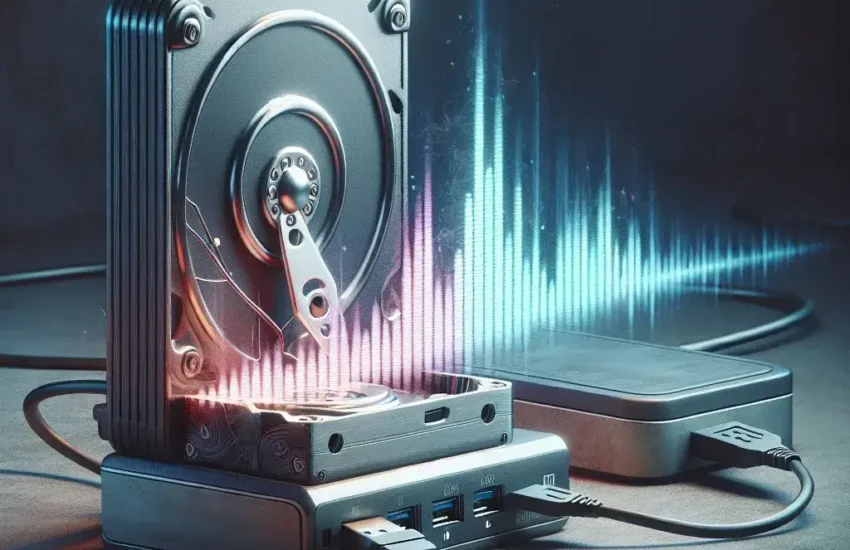External hard drives are an indispensable part of many people’s computing lives. They provide valuable storage space, backup capabilities, and portability. However, when an external hard drive starts making noise when plugged into a USB hub, it can be a cause for concern. This article aims to explore potential causes for this issue, discuss preventive measures, and provide steps for troubleshooting.
Before diving into solutions, it’s important to understand the various types of noises that external hard drives might produce and what they may indicate.
| Type of Noise | Possible Cause | Implication |
|---|---|---|
| Clicking | Mechanical failure | Drive may fail |
| Spinning | Normal operation | Drive is functioning |
| Beeping | Power issues | Insufficient power supply |
| Whirring | Drive working | Normal operation |
| Grinding | Internal damage | Possible data loss |
Understanding External Hard Drive Noises
To address noise issues, it’s essential first to identify the type of sounds your external hard drive is making:
1. Clicking Sounds
Clicking noises are often a sign of mechanical failure. This can occur if the drive’s read/write head is unable to park itself, potentially leading to data loss. If you hear this sound, it’s crucial to stop using the drive immediately and consider data recovery options.
2. Spinning Sounds
A regular spinning sound indicates that the hard drive is working correctly. The internal motor is running, and data can be read and written. If you also hear a clicking noise along with spinning, however, it may point to a bigger problem.
3. Beeping Sounds
If your external hard drive emits a series of beeping noises, this usually indicates there is an issue with the power supply. It may be drawing more power than the USB hub can provide, especially if multiple devices are connected to it.
4. Whirring Sounds
Whirring is typically normal for external hard drives during operation. However, if it is accompanied by abnormal sounds like clicking or grinding, it could signify a more severe problem.
5. Grinding Sounds
Grinding noises can indicate internal damage to the hard drive. This sound is particularly concerning and warrants immediate action as it may lead to data loss.
What to Do When You Hear Noise?
When you detect unwanted noise from your external hard drive, there are several steps you can take to troubleshoot the issue:
1. Disconnect from USB Hub
Your first action should be to safely disconnect your external hard drive from the USB hub. This prevents further damage while you assess the situation.
2. Plug Directly into the Computer
After unplugging the hard drive from the hub, connect it directly to your computer. This can help determine whether the issue lies with the hub or the hard drive itself. If the noise persists, it suggests a problem with the hard drive.
3. Check the Power Supply
If you suspect that insufficient power from the USB hub may be the problem (especially if you heard beeping), check to make sure that your external hard drive is receiving adequate power. Some external drives have a separate power supply that should be connected.
4. Assess the USB Hub
If the hard drive works fine when connected directly to the computer, the USB hub may be at fault. Evaluate whether the hub is functioning correctly by testing it with other devices.
5. Listen for Additional Noises
While the hard drive is plugged into the computer, pay attention to whether the noises continue or increase. A constant clicking sound is a significant warning sign of imminent failure.
Preventive Measures
To prevent future noise issues and potential data loss, consider implementing the following preventive measures:
1. Use Quality Equipment
Invest in a good quality USB hub that provides sufficient power and supports the data transfer speeds required for external hard drives.
2. Regular Backups
Always keep a backup of important data on the external hard drive in another location (e.g., cloud storage or another external drive). This way, you minimize the risk of data loss due to hardware failure.
3. Keep the Drive in a Safe Location
Avoid placing the hard drive in precarious locations where it might fall or get bumped. Physical shocks can lead to mechanical issues.
4. Regular Maintenance
Perform periodic checks and maintenance on your external hard drive. This includes running diagnostics and updating the firmware when necessary.
When to Seek Professional Help
If you cannot resolve the noise issue yourself, it may be time to consult a professional data recovery service. They can diagnose more complex problems and advise you on restoring lost data. Do not try to disassemble your external hard drive, as this may void any warranty and cause irreversible damage.
Conclusion
Noisy external hard drives can be a source of concern, but by understanding the types of noises and reacting appropriately, you can minimize the risk of data loss and hardware failure. Regular maintenance, quality equipment, and timely action are all essential in ensuring the longevity of your external hard drive.

